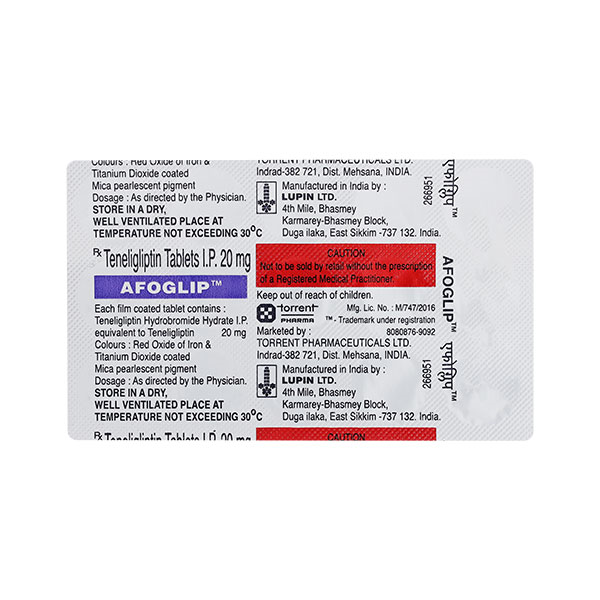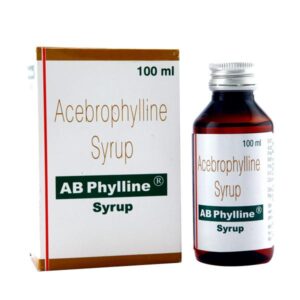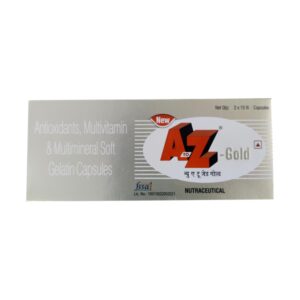Product Introduction:
Afoglip Tablet is a medication that contains Teneligliptin in a strength of 20mg. Teneligliptin is an oral antidiabetic agent belonging to the class of dipeptidyl peptidase-4 (DPP-4) inhibitors. Afoglip Tablet is designed to assist in the management of type 2 diabetes by improving glycemic control.
Afoglip Tablet is normally prescribed when diet and exercise alone or other medicines do not prove sufficient to control your blood sugar level. Your doctor may prescribe it alone or in combination with other diabetes medicines. It can be taken with or without food. The dose will depend on your condition and blood sugar levels. Use it strictly as advised by your doctor.
You should take it regularly at the same time each day to get the most benefit from it. Do not stop taking the medicine unless your doctor recommends it. This medicine helps you control your blood sugar levels and prevent serious complications in the future. It is important to stay on the diet and exercise program recommended by your doctor while taking this medicine. Your lifestyle plays a big part in controlling diabetes.
The most common side effects of this medicine are hypoglycemia, constipation, dizziness, headache, diarrhea. It is important to recognize the symptoms of hypoglycemia (such as lightheadedness, sweating, dizziness, fainting, and dry mouth) and know how to deal with it. You can carry sugar or glucose candy and have them to control your symptoms if you experience any. Contact your doctor if the side effects if they do not go away or worry you.
Before taking this medicine, let your doctor know if you have ever had kidney disease, heart disease, or pancreas problems. Pregnant or breastfeeding women should also consult their doctor before taking it. Some other medicines you are taking may interfere with this medicine’s working. So, make sure your doctor knows about all the other medicines you are using. Limit your alcohol intake while taking this medicine because it can increase your risk of developing low blood sugar levels. You may need regular tests such as kidney function and blood glucose levels to check that the medicine is working properly.
Benefits:
- Blood Glucose Regulation: Afoglip with Teneligliptin supports the regulation of blood glucose levels by inhibiting the degradation of incretin hormones.
- Insulin Sensitivity: Teneligliptin enhances the body’s response to insulin, promoting better glucose utilization.
- Postprandial Glucose Control: It is particularly effective in controlling post-meal spikes in blood sugar levels.
- Long-term Efficacy: Teneligliptin is known for its sustained efficacy over time, contributing to stable diabetes management.
Side Effects:
Common side effects may include:
- Headache: Mild to moderate headaches may occur.
- Upper Respiratory Tract Infections: Some individuals may experience respiratory infections.
- Hypoglycemia: Though less common, it can occur, especially when used with other antidiabetic medications.
Usage Guidelines:
- Dosage: Follow the prescribed dosage as directed by your healthcare provider.
- Administration: Typically taken orally, with or without food, as advised by the healthcare professional.
- Regular Monitoring: Periodic monitoring of blood glucose levels is essential for optimal diabetes management.
- Missed Dose: If a dose is missed, take it as soon as possible. However, skip the missed dose if it’s almost time for the next scheduled dose.
Drug Interactions:
- Rifampicin: May decrease the concentration of Teneligliptin.
- Ketoconazole: May increase the concentration of Teneligliptin.
- Insulin or Sulfonylureas: Increased risk of hypoglycemia when used concomitantly.
It is crucial to inform your healthcare provider about all medications, including over-the-counter drugs and supplements, before starting Afoglip Tablet. Regular follow-ups and adherence to the prescribed treatment plan are essential for effective diabetes management and to monitor for any potential side effects or interactions.
SAFETY ADVICE

Alcohol

Pregnancy

Breast feeding

Driving

Kidney

Liver
However, no clinical evidence is established for its use in patients with severe kidney impairment.
| Weight | 0.5 kg |
|---|---|
| Dimensions | 10 × 10 × 10 cm |




